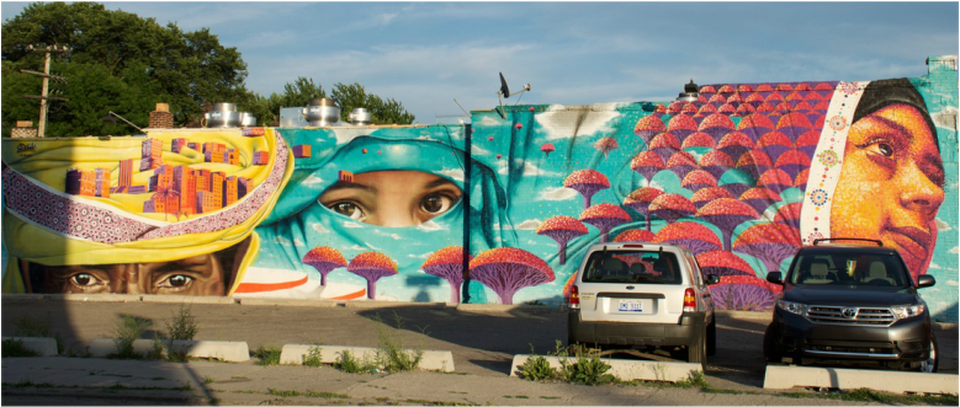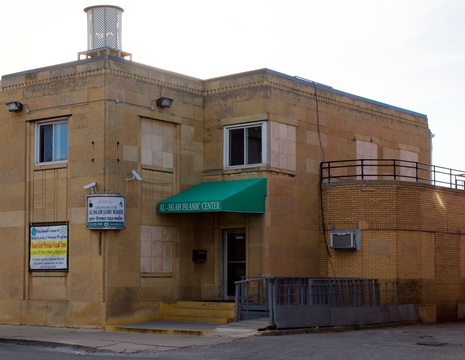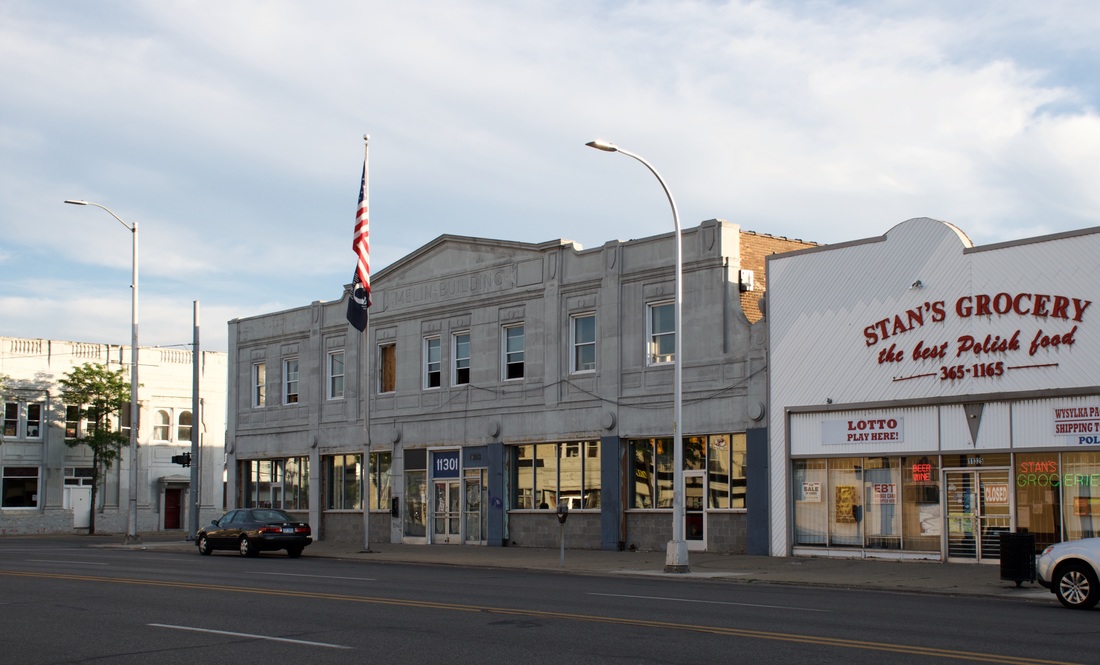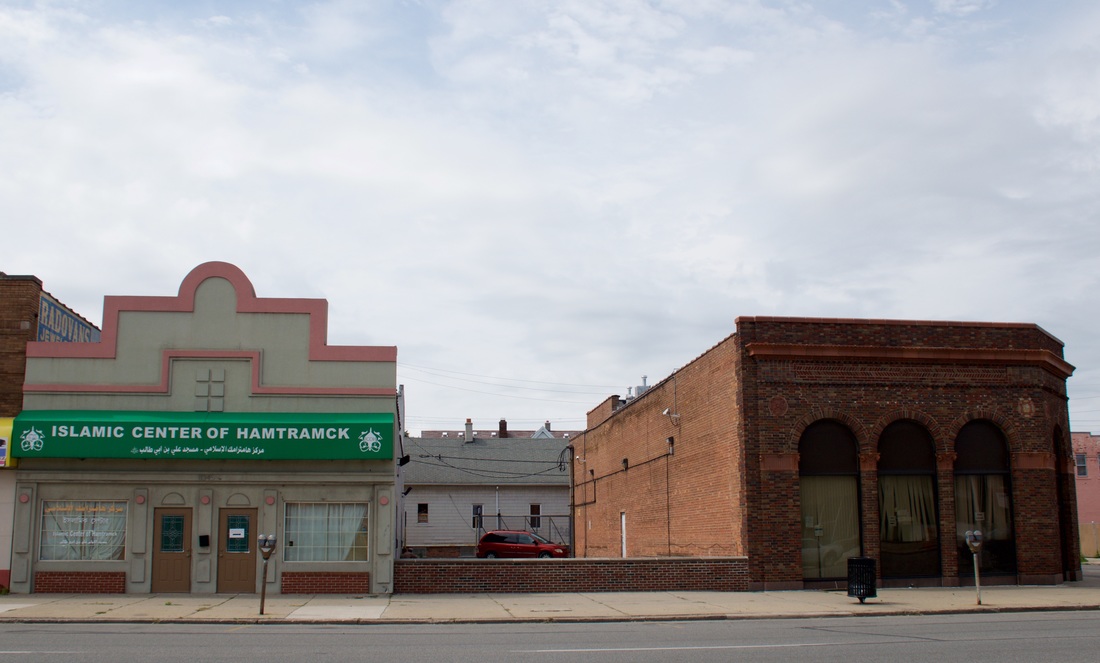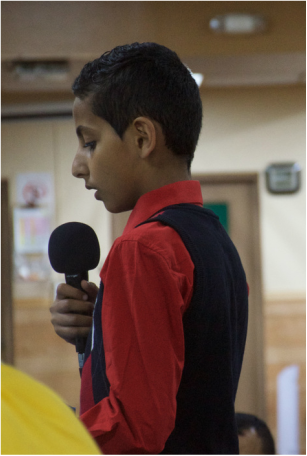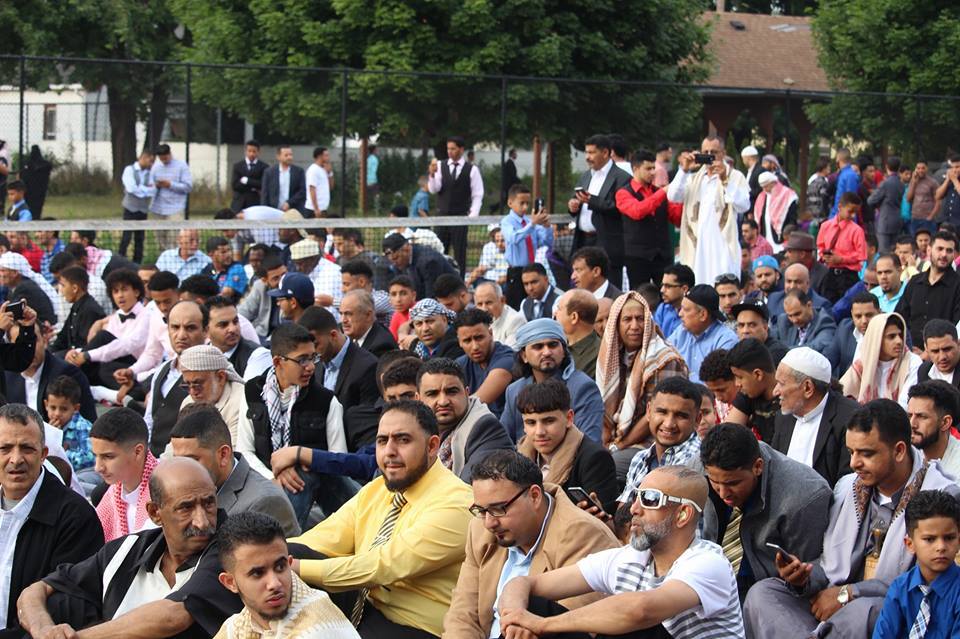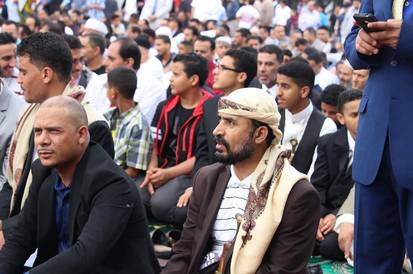Muslim Community
Today, Hamtramck's multi-ethnic Muslim population is predominantly composed of Bangladeshi, Yemeni and Bosnian Americans. The Bangladeshi immigrants began slowly establishing communities in Detroit and Hamtramck starting in the 1930s, followed by Yemeni immigrants in the 1960s. The population surges came in the 1990s and early 2000s when major waves of immigration brought thousands of newcomers to Hamtramck, including refugees of the Bosnian civil war. The stories and photographs on this page explore the establishment of the first mosques in the city, the passage of the call to prayer (Adhan), and other aspects of personal, political and social life in the Muslim community.
Opening Mosques in Hamtramck
Abdul Motlib, the President of Al-Islah Islamic Center (Al-Islah Jame Masjid), narrates the opening of the first Bangladeshi mosque in the city.
Abdul: No, the second mosque in Hamtramck, first mosque was Bosnian. Bosnian American Council. Same on Caniff between Gallagher and Conant, first mosque, Bosnian mosque. And second one is Al-Islah. 8535 something, or 3585, you know last building of Joseph Campau, left side. This building we make mosque for rent $350. Then after six month we cannot make space over there. After that we think, now we have to buy a new building, we buy this building. Now this building also Friday everywhere is packed. Parking lot, we have two space for people in the parking lot— full. Even night time, now Ramadan month especially, at night time is our big prayer. Like one and half hour prayer time, big congregation. So we need more space. Around Al-Islah over there is big space, big area. When you go inside you’ll be surprised how big it is.
|
Muhammed Alagi is originally from Yemen and moved to Hamtramck in the 1960s. Here, he reflects on the first Arabic schools and how the community has changed since the establishment of the first mosque. Muhammed and Omar Alkusari are members of the Islamic Center of Hamtramck.
|
Interviewer: Do you remember when they started setting up the schools?
Muhammed: Mid-80s I think or 90s, that’s when they get, start get expanding you know. They had a lot of— started with that little place where they teach the high school now I think, right across the road. It’s like, maybe 30, 40 people can go pray in that place. And it was, I think it was a Roman Catholic Church there so that’s what I was doing.
Omar: It was a funeral build— the funeral home for the church. They sold it for some reason and then— How long after they sold that to the Muslims did the Muslims actually buy the church with the school?
Muhammed: I think, I don’t exactly remember but I think it’s beginning of the 90s or maybe in the mid 90s.
Omar: Where were they praying before there? What made them go—
Muhammed: Most of the people they pray in the houses. Some of them, the ones who pray, but some of them they don’t, they don’t pray you know, back then. Sometimes they go to Dearborn, whenever you want to pray you go to the mosque in Dearborn. Then they decide buy that place because everybody was spread around in you know, in Detroit area, Boulevard, Jefferson, 6 Mile, 7 Mile. They were not in one places.
It’s good right now, I mean it’s, you know, you can run to any community you want to go because everything is close, everything is local, you know, you go to pray in this mosque you go pray in this mosque, it’s good. It’s not like it used to be, same time everybody was, we were like, shy, because everybody heard about church church church church church church you know? Try to wear your clothes, going outside, try to go and pray in public and you know, and the money you know? I mean, you know, you gonna go pray, you gonna go pray outside, you gonna get robbed, maybe you gonna go here, you gonna get robbed, or you gonna get killed and all that. But now it’s good, you know. Most of the community is Muslim. Bosnia they finally start become their own culture, you know they Muslim, they have their own mosque even if they here before but they were no practice. Same thing with Albanians, same thing with you know, even the town was mixed cultures but nobody had it now like they’re doing it.
Muhammed: Mid-80s I think or 90s, that’s when they get, start get expanding you know. They had a lot of— started with that little place where they teach the high school now I think, right across the road. It’s like, maybe 30, 40 people can go pray in that place. And it was, I think it was a Roman Catholic Church there so that’s what I was doing.
Omar: It was a funeral build— the funeral home for the church. They sold it for some reason and then— How long after they sold that to the Muslims did the Muslims actually buy the church with the school?
Muhammed: I think, I don’t exactly remember but I think it’s beginning of the 90s or maybe in the mid 90s.
Omar: Where were they praying before there? What made them go—
Muhammed: Most of the people they pray in the houses. Some of them, the ones who pray, but some of them they don’t, they don’t pray you know, back then. Sometimes they go to Dearborn, whenever you want to pray you go to the mosque in Dearborn. Then they decide buy that place because everybody was spread around in you know, in Detroit area, Boulevard, Jefferson, 6 Mile, 7 Mile. They were not in one places.
It’s good right now, I mean it’s, you know, you can run to any community you want to go because everything is close, everything is local, you know, you go to pray in this mosque you go pray in this mosque, it’s good. It’s not like it used to be, same time everybody was, we were like, shy, because everybody heard about church church church church church church you know? Try to wear your clothes, going outside, try to go and pray in public and you know, and the money you know? I mean, you know, you gonna go pray, you gonna go pray outside, you gonna get robbed, maybe you gonna go here, you gonna get robbed, or you gonna get killed and all that. But now it’s good, you know. Most of the community is Muslim. Bosnia they finally start become their own culture, you know they Muslim, they have their own mosque even if they here before but they were no practice. Same thing with Albanians, same thing with you know, even the town was mixed cultures but nobody had it now like they’re doing it.
|
Abdul Kaed, interpreted by Omar Alkusari, explains Muslim unity across different nationalities and a culture of praying at more than one mosque.
|
It will be time will tell. Our kids now, they are not like us. They are good income, they are good education. Of course they will choose better. Like my son makes a business in Warren. Eleven mile and Dequindre business, pharmacy. He used to be living in Hamtramck now he lives in Warren. So, when we are living where only God knows.
-Abdul Motlib, President of Al-Islah Islamic Center
|
Arif Huskic discusses Muslim unity across mosques. He remembers the two-car garage that served as the first place of worship for Bosnian Muslims in Hamtramck and the subsequent growth of the community.
|
Leadership
|
Abdul Motlib discusses what it has meant to him to be continuously elected as President of Al-Islah Islamic Center. He explains how his understanding of leadership is deeply informed by his Islamic faith.
|
Interviewer: What do you think in your life has led to you to be such a great leader that you're the president of the Islamic Center?
Abdul: That is choose by Allah. I cannot be a leader. In our religion say if you are ten people together, there was a one leader, but choose by Allah. If you are together forty people, there’s another leader choose by Allah. But who will be a leader? That is chosen by Allah.
Abdul: That is choose by Allah. I cannot be a leader. In our religion say if you are ten people together, there was a one leader, but choose by Allah. If you are together forty people, there’s another leader choose by Allah. But who will be a leader? That is chosen by Allah.
|
Arif Huskic talks about his role in the community, philosophy on helping people, and reasons for fasting during Ramadan.
|
Arabic and Islamic Education
Abdul: When we are like four or five years, then we go to study in our religious school. Which is here [Al-Islah Islamic Center], every Saturday, Sunday we make morning school from 10 to 1, 10 to 2, and those kids coming like four, five, six, eight, ten, twenty. They start from the alphabet, Arabic alphabet and they finish our religion book, Qur’an, which is behind you people.
|
Hamtramck Changes: Culture, Work, Businesses
|
Muhammed Alagi reflects on the days when "Hamtramck was the best town to get around, to work." He talks about his job at Lafayette Coney Island and his boss who sponsored his family's move to the United States. In the second clip, he discusses some of Hamtramck's biggest changes: the influx of Bengalis and other immigrant Muslim communities, population decrease, impact of the media, cleanliness of the city, and neighborhood relations.
|
Broadcasting the Call to Prayer (Adhan)
In the last decade, Hamtramck's Muslim community has repeatedly drawn international media attention, first in 2004 after the city passed legislation allowing all religious broadcasts, including the broadcast of the Call to Prayer (Adhan), and again in 2015 when the city elected the first majority-Muslim city council in the United States. Muslim and non-Muslim residents alike have found that the portrayal of controversy was largely inaccurate. In the stories below, Hamtramckans reflect on how the issue was portrayed and how controversy was instigated by outsiders.
|
Reverend Sharon Buttry describes the successful interfaith collaboration that led to Hamtramck's legalization of religious broadcasts.
Sharon: I think it was 2004 when the first mosque wanted to do the call to prayer and I think it’s really fascinating that the Polish Catholic Priest across the street from the mosque and the Imam already had a relationship. So it was discovered that the city council could only find one ordinance that would govern this call to prayer being broadcast from a loudspeaker. So the Polish Catholic priest and the imam got together to work on amending this ordinance because the catholic church was broadcasting the church bells. So they made common cause so both could have their call to prayer— one being bells, one being spoken. So I thought that was really wonderful how they came together, in fact that’s how I got involved in interfaith work because the Polish Catholic priest and I were very good friends. He was another activist Father Stan Ulman, I don’t know if anyone’s mentioned in your travels. Stan Ulman, he’s in Rochester now. But he was originally from Hamtramck. And he was a spiritual leader who embraced the changes and really facilitated the peaceful transition of Muslims into Hamtramck. So just all of that to say that the changes that have taken place have been blessed by some leaders and other leaders have made it occasion to bring division. I see leadership as really a key part of how these things get handled.
|
Abdul Motlib recalls how the Call to Prayer legislation was passed in 2004. He explains that despite the portrayal in the media, the issue was not a major religious or political controversy but a time of significant interfaith collaboration and understanding.
Abdul: Me and my friend thinking this: Hamtramck is...unique, nice, everything there but we need to think about how we can remain for one mosque, practice our religion. Then we start. So when we start we start on Joseph Campau, end of Joseph Campau. One small story we rent and start. So after one year this building we buy. And after finishing work we move here. So in end of 2003 we are thinking about the call to prayer because in front of our mosque we have a church, big church. And every hour they make bell over there. So we think, if they can do bell over there, why we are not thinking about our call to prayer? So we start call to prayer also. Contact the city, contact with some department. And it was big issue in 2004.
Below, Muhammed Alagi, Arif Huskic, and Abdul Kaed share their memories of various instances of controversy and unity surrounding the Adhan broadcast.
Greg Kowalski recalls what it was like becoming international news and the attempts by outsiders to create controversy and conflict.
|
Islamophobia
|
Arif Huskic invites non-Muslims to learn about Islam.
Arif: People in the community, they was unfamiliar with Islam at all. So to say about any faith anything negative, should know faith to find something positive. So many people find themself that Islam as religion is great religion, fast growing religion and that is a religion of peace and uniting the people. So the people even embracing Islam which is, which is unbelievable that they are embracing Islam even after they were thinking how to shut mosques down in 2002 and 3. A lot of people— non-Muslims back then— they are now Muslims because they tried to find out what they hate so once they find out what they really hate they become to be lovers of that and they are Muslims now, thank God. So if God give you something no one taking you away from you. So the religion of Islam is granted from God and that is in his hands who love it or doesn't like it— I really cant help, this is from God. Really I would recommend everyone who doesn't have a knowledge about Islam to take a book or go on Internet now time you can google about Islam, about any questions you may have. Feel free go to any mosques, talk to people, just friendly talk, no “I hate you,” well you don't know why and later on— you cannot hate your pants because you cannot go without pants.
|
Interpreter Omar Alkusari explains the culture of acceptance that exists in Yemen and is lacking in the United States.
|
Families & Relationships
|
Muhammed Alagi explains why he believes in arranged marriages.
|
|
Arif Huskic describes the separation of women and men during prayer.
|
|
In the first clip, Abdul Motlib reflects on the experience of having family all over the world. Having left his own parents to immigrate to the United States, he considers how his family is fortunate to live together in Hamtramck. In the second clip, he notes that the tradition of arranged marriages which was popular in his generation is changing significantly with his children's generation.
Interviewer: Are you married?
Abdul: I am married, yeah. Interviewer: And how did you meet your wife? Abdul: Well my father and mother arranged for me. Our Muslim, most of these chosen by father, mother, then is married. But now is going to be a change. Because now it’s son like daughter, daughter like son, they’re also arranging. So different time, a different situation coming. Interviewer: Do you think that’s a positive change? Abdul: Yeah, oh yeah. |
